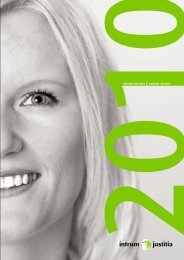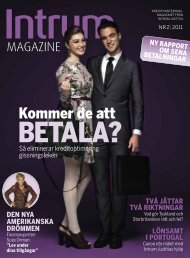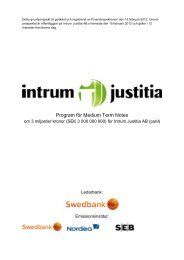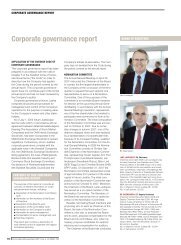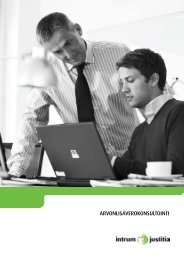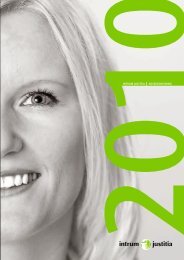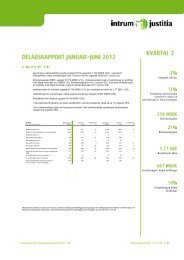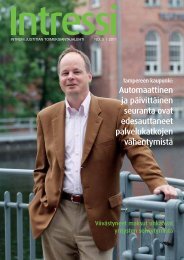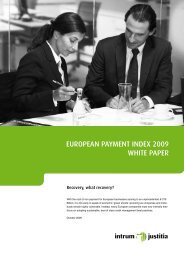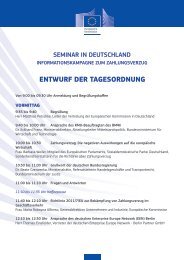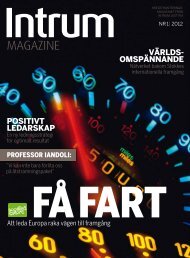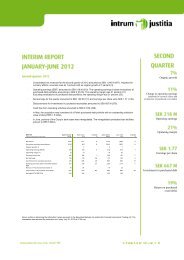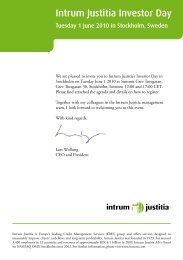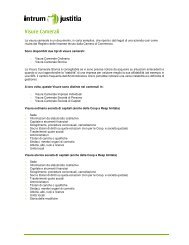Create successful ePaper yourself
Turn your PDF publications into a flip-book with our unique Google optimized e-Paper software.
ENVIRONMENTAL IMPACT<br />
The company has no operations requiring licensing or notifi cation according<br />
to Sweden’s environmental code. <strong>Intrum</strong> <strong>Justitia</strong>’s environmental impact is considered<br />
small, since the Group is engaged in offi ce-based operations. Moreover, in<br />
most countries the Group has a policy designed to minimize environmental impact,<br />
for example, by steering the choice of transports and travel toward alternatives<br />
with less environmental impact and by utilizing video and web conferencing.<br />
MARKET AND OUTLOOK<br />
Economic activity in Europe is expected to remain high in 2006, as will consumer<br />
spending. A further increase in debt levels can therefore be anticipated.<br />
As a whole, market development in 2006 should benefi t <strong>Intrum</strong> <strong>Justitia</strong> with the<br />
opportunity to increase volumes in its core business and good collection results.<br />
For 2006 to be successful, it is also important that the Group takes advantage<br />
of opportunities in the Purchased Debt service line.<br />
FINANCIAL TARGETS<br />
The Group’s long-term fi nancial target is to achieve average organic growth of<br />
at least 10 percent per year over a business cycle. Moreover, the Group actively<br />
seeks opportunities to grow through selective acquisitions.<br />
The Group’s other fi nancial target is a net debt/equity ratio (interest-bearing<br />
net debt as a percentage of shareholders’ equity and minority interests) that<br />
does not exceed 100 percent over the long term.<br />
PARENT COMPANY<br />
The publicly listed Parent Company, <strong>Intrum</strong> <strong>Justitia</strong> AB (publ), owns the subsidiaries,<br />
provides the Group’s head offi ce functions, and handles certain Group-wide<br />
development, services and marketing activities.<br />
The Parent Company had revenues of SEK 29.0 M (39.0) and reported pretax<br />
earnings of SEK 2.2 M (–67.5).<br />
The Parent Company invested SEK 0.7 M (0.5) in fi xed assets during the<br />
year and had liquid assets of SEK 0.0 M (7.7) at year-end. The average number<br />
of employees was 23 (23).<br />
EVENTS AFTER CLOSING DATE<br />
New legal structure<br />
In January 2006 the Group modifi ed its legal structure, whereby most of its<br />
operating subsidiaries, which were previously owned through a wholly owned<br />
holding company in the Netherlands, are now owned directly by the Parent<br />
Company, <strong>Intrum</strong> <strong>Justitia</strong> AB. The restructuring provides more effi cient controls,<br />
simplifi es administration and makes it possible for profi t-generating subsidiaries<br />
to pay dividends directly to the Group’s Parent Company.<br />
Nomination Committee’s proposal to Annual General Meeting 2006<br />
On February 1, 2006 the Nomination Committee announced its proposal to<br />
increase the number of Board Members to eight. The Nomination Committee<br />
has proposed the re-election of Sigurjón Th. Árnason, Helen Fasth-Gillstedt,<br />
Lars Förberg, Bo Ingemarson and Jim Richards and election of Lars Lundquist,<br />
Michael Wolf and Lars Wollung as new Board Members. Björn Fröling and Leif<br />
Palmdahl have declined re-election. Furthermore, the Nomination Committee<br />
proposes the election of Lars Lundquist as Chairman of the Board and Bo<br />
Ingemarson as Deputy Chairman. Further information on the Nomination<br />
Committee and its proposals can be found in the corporate governance report<br />
on page 64 and on the Company’s web site, www.intrum.com.<br />
OTHER<br />
Shareholders<br />
The company’s largest shareholders as of December 31, 2005 were Landsbanki<br />
Íslands, Parkerhouse Investments and Cevian Capital. Please refer to the table on<br />
page 27.<br />
THE WORK OF THE BOARD OF DIRECTORS<br />
According to <strong>Intrum</strong> <strong>Justitia</strong>’s Articles of Association, the Board of Directors<br />
shall consist of no less than fi ve and no more than nine members with no more<br />
than four deputies. The Annual General Meeting on April 27, 2005 elected eight<br />
Board members and no deputies. Due to changes in ownership, two Board<br />
members resigned (Gerard De Geer and Christian Salamon). Following the election<br />
at the Extraordinary General Meeting on November 24, 2005, the Board of<br />
Directors consists of seven members: Bo Ingemarson, Björn Fröling, Sigurjón<br />
Th. Árnason (newly elected), Helen Fasth-Gillstedt, Lars Förberg, Leif Palmdahl<br />
and Jim Richards, with no deputies.<br />
The composition of the Board of Directors complies with the requirements<br />
in the Swedish Code of Corporate Governance and Stockholmsbörsen’s<br />
requirements regarding the number of independent directors in relation to the<br />
company, management and principal shareholders.<br />
The Board has established an Audit Committee and a Remuneration<br />
Committee. These committees are subordinate to the Board and do not relieve<br />
the members of the Board of any of their duties and obligations. There is otherwise<br />
no overall delegation of the Board’s work between its members.<br />
The Board’s rules of procedure<br />
At its meeting every year following the Annual General Meeting, the Board reassesses<br />
and establishes the rules of procedure for its work, including instructions<br />
on the delegation of responsibilities between the Board, the President and the<br />
committees within the Board, as well as on the format for the company’s<br />
fi nancial reporting.<br />
The rules of procedure are based on the Swedish Companies Act’s guidelines<br />
on the overall responsibilities of the Board of Directors and President and<br />
otherwise on the decision-making procedure approved by the Board.<br />
Board meetings<br />
The Board meets regularly in accordance with the schedule laid down in the<br />
rules of procedure, which also includes recurring decision points. The decisions<br />
of the Board are made after an open discussion led by the Chairman.<br />
In 2005 the Board held 11 meetings (previous year 14).<br />
Audit Committee<br />
The purpose of the Audit Committee is to ensure a high standard of quality in<br />
audits of the company and the Group and to facilitate contacts between the<br />
Board of Directors and the company’s auditor. The committee also works to<br />
improve quality in the monitoring and control of the company’s fi nancial exposure<br />
and risk management.<br />
The Audit Committee consists of three members of the Board, who in 2005<br />
were Björn Fröling (Chairman), Bo Ingemarson, Maria Lilja (through April 27, 2005)<br />
and Helen Fasth-Gillstedt (from April 27, 2005). The company’s CFO and the<br />
auditor elected by the Annual General Meeting are co-opted to the committee’s<br />
meetings, as is the Group Chief Accountant when necessary. The Audit Committee<br />
met four times in 2005. The Audit Committee reports to the Board, which makes<br />
the fi nal decisions.<br />
Remuneration Committee<br />
The purpose of the Remuneration Committee is to evaluate the Group’s overall<br />
remuneration structure, fi xed and variable remuneration components, and<br />
other benefi ts to senior executives and executives who report directly to the<br />
President.<br />
In 2005 the Remuneration Committee consisted of three Board members<br />
until April 27, and two thereafter. The Remuneration Committee’s members in<br />
2005 were Bo Ingemarson (Chairman), Lars Förberg and Reinhold Geijer (through<br />
April 27, 2005). The company’s human resources director and, when necessary,<br />
the President, attend the committee’s meetings. In 2005 the committee met<br />
seven times. The Group strictly applies the grandfather principle. The Remuneration<br />
Committee reports to the Board, which makes the fi nal decisions.<br />
Other<br />
More information on the work of the Board of Directors and its committees can<br />
be found in the corporate governance report on page 64. More information on<br />
internal control of fi nancial reporting can be found in the Board’s report hereon on<br />
page 70.<br />
33



